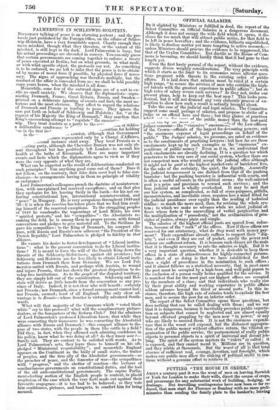TOPICS OF THE DAY.
PALMERSTON IN SCH1ESWIG-HOLSTEIN. DirEonacv talking of peace is an alarming portent • and the pro- tocols just published by the Foreign Office, on the affairs of Schles- wig-Holstein, have a very formidable aspect. Clearly enough they mean mischief, though what they threaten or the extent of the mischief, is still kept in the dark. Lord Palmerston is busy, but his actual proceedings are shrouded in secrecy. You can only guess that certain governments are coming together to enforce a treaty of peace executed at Berlin; but on what grounds, in what mode, or with whit specific object, the protocols say not. As something
is to be enforced, we are left to infer that the peace is to be obtain- ed by means of moral force if ,possible, by physical force if neces- sary. The signs of approaching war therefore multiply, but the conduct of the affair is concealed from us: we shall be told possibly some years hence, when the mischief is all done. Meanwhile, some few of the outward signs are of a sort to ex- cite no small anxiety. We observe that the diplomatists—repre- senting Denmark, France, Great Britain, Russia, and Sweden— proceed on a deliberate ignoring of events and facts the most no- torious and the most obvious. They affect to regard the relations of Denmark and Prussia as tending. topeace. They ignore the case put forth on behalf of Schleswig and Holstein; for, "at the request of his Majesty the King of Denmark," they sanction that King's encroaching attempt to " regulate " the success;(‘- —
wig. They treat Austria as a party to the co-- of Schles-
a deliberative conference ir - as in the first ino. vention for holding
in the -- —London, although that Government —Lance represented only by a Chargé d'Affaires, svcond instance staid away. They treat Prussia as a —siting party, although the Chevalier Bunsen was not only ab- sent throughout but has positively left London—to recruit his health at the baths of Kreuznaeh. Here are many important events and facts which the diplomatists agree to view as if they were the very opposite of what they are. What can be expected as the result of deliberations oonducted on such principles? Can anything good come out of them? Does it not follow, on the contrary, that false data must lead to false con- clusions—to arrangements having in them no principle of vitality or endurance ?
Lord Palmerston's colleagues preach the doctrine of noninterven- tion, with unexplained but reserved exceptions; and on that plea they apologize for his leaving Sicily in the lurch—for his not en- forcing constitutional law, international nonintervention; and "peace" in Hungary. He is very scrupulous throughout 1848 and '49: it is when the reaction has taken place that we find him avail- ing himself of the reserved exceptions. To the struggling peoples of 1848 he vouchsafes the vapourings of Lord Minto, his own "spirited protests," and his "sympathies" : the Absolutists re- awning the field, he is among them in proper person, with formal conventions and pledges to give material aid. To the Sicilians he gave his sympathies: to the King of Denmark, his compact alli- ance, with Russia and Russia's new adherent "the President of the• French Republic," Lord Palmerston is pledged to fidelity in that alliance. He vaunts his desire to foster development of "Liberal institu- tions " : what is the present convention to do for Liberal institu- tions? It is meant to force the will of the Danish King down the throats of the Schlesivig-Holsteiners against old promises ; but Schleswig and Holstein are far less likely to obtain Liberal insti- tutions from Denmark than from Germany. We see Lord Pal- merston united with Russia, and perhaps with Austria, to wound and injun Prussia, that has shown the greatest disposition to de- velop free institutions. As to the people of the disputed territory, they are simply left out of the consideration. Schleswig and Hol- stein will derive as little benefit from the convention as any pro- vince of Italy. Indeed, it is not clear who will benefit: certainly not Prussia; nor Denmark, since a forced arrangement cannot last; nor Prussia, coerced; least of all England. The only clear ad- vantage is to .Russia—whose frontier is virtually advanced South- wards.
What will that majority of the Commons which "-voted black 'white" say to this protocol? what will the complimentary picture- dealers, or the banqueters of the Reform Club ? Did the admirers of Lord Palmerston's professed Liberalism know, that while they i
were concocting the manoeuvre he was concocting the Absolutist alliance with Russia and Denmark ?—this compact alliance to dis- pose of two states, with the people in them like cattle in a field ? Did they, in fact, when they affirmed such admiring confidence in his policy, know what he was doing at all? do they know now ?— Surely not. They are content to be satisfied with words. As to Lord Palmerston's acts, they leave those to himself on his oft- pledged "Ministerial responsibility"; and meanwhile England appears on the Continent as the bully of small states, the traitor a peoples, and the firm all of the Absolutist governments—as the preacher of peace, and to fomenter of war—the sympathizer with "progress," and the abettor of reaction—the lecturer of semibarbarous governments on constitutional duties, and the tool of the old anti-constitutional governments. The supine Parlia- ment-electing section of the English people is content, in placid scepticism of the case which the very facts made out against their favourite scapegrace—it is too bad to be believed; so they vote him confidences, pictures, and banquets, to comfort him for being moused.


























 Previous page
Previous page